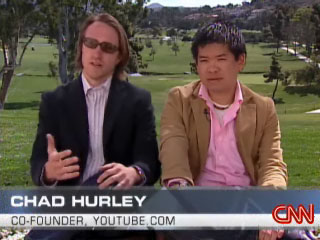From Marshall Kirkpatrick at Splashcast comes word of an interesting development at YouTube: the launch of a dedicated politics “channel,” hosted (if that’s the right word) by news and politics editor Steve Grove, which aims to aggregate all the political video clips that get uploaded to the Tube (so far there are only 10, and the channel has about 500 subscribers).
 But I would expect this channel is going to involve more than just aggregating — or at least I hope so. I (and plenty of other people) have already seen Steve Grove interview Phil De Vellis, aka ParkRidge47, about why he created the Hillary Clinton Vote Different/1984 video, and if the new YouTube “editor” does more of that kind of interviewing things could get very interesting indeed (Phil De Vellis, incidentally, is going to be a panelist at the upcoming mesh conference in Toronto, which I am helping to organize).
But I would expect this channel is going to involve more than just aggregating — or at least I hope so. I (and plenty of other people) have already seen Steve Grove interview Phil De Vellis, aka ParkRidge47, about why he created the Hillary Clinton Vote Different/1984 video, and if the new YouTube “editor” does more of that kind of interviewing things could get very interesting indeed (Phil De Vellis, incidentally, is going to be a panelist at the upcoming mesh conference in Toronto, which I am helping to organize).
With YouTube hosting a politics channel, and Huffington Post working with NewAssignment.net to field a bunch of citizen journalists, the upcoming U.S. election campaign could be very interesting indeed. If YouTube were still a small startup, this might be seen as a “power to the people” kind of move, but now that the video site is part of the Googleplex, there are already some — like Republican media strategist David All — who are concerned about the amount of power and influence Google has.

 There are a couple of obvious problem with this, one of the first being that interviewing CEOs of startups is Bambi’s actual job, and now she is starting a company to do that separate from Marketwatch. But it gets worse: according to both the WSJ and ZDNet, Ms. Francisco owns a stake in Vator.tv, and her main partner and financial backer in the venture is none other than Peter Thiel, a cofounder of PayPal and now a venture capitalist. Bambi’s coverage at Marketwatch has also mentioned both Mr. Thiel and some of the various technology companies that he has invested in or advises.
There are a couple of obvious problem with this, one of the first being that interviewing CEOs of startups is Bambi’s actual job, and now she is starting a company to do that separate from Marketwatch. But it gets worse: according to both the WSJ and ZDNet, Ms. Francisco owns a stake in Vator.tv, and her main partner and financial backer in the venture is none other than Peter Thiel, a cofounder of PayPal and now a venture capitalist. Bambi’s coverage at Marketwatch has also mentioned both Mr. Thiel and some of the various technology companies that he has invested in or advises. Meant to blog this earlier when I came across it, but a guy named Matt — a student at Stanford studying design and business — wrote
Meant to blog this earlier when I came across it, but a guy named Matt — a student at Stanford studying design and business — wrote  The community thing is interesting, and it’s worth wondering — as
The community thing is interesting, and it’s worth wondering — as  Eric Savitz at Barron’s Online has an item about Yahoo and Facebook, in which he quotes Needham analyst Mark May as saying that Yahoo may have missed
Eric Savitz at Barron’s Online has an item about Yahoo and Facebook, in which he quotes Needham analyst Mark May as saying that Yahoo may have missed